| Listing 1 - 10 of 61 | << page >> |
Sort by
|
Book
ISBN: 1003311792 1000822591 1000822575 103231866X Year: 2023 Publisher: Abingdon, Oxon, England ; New York, New York : Routledge,
Abstract | Keywords | Export | Availability | Bookmark
 Loading...
Loading...Choose an application
- Reference Manager
- EndNote
- RefWorks (Direct export to RefWorks)
"This book unpacks and interrogates dominant constructions of mothering, making use of interdisciplinary, ideological and theoretical perspectives to investigate how new rhetorics of mothering can expand the realm of maternal care-givers beyond the biological definitions of motherhood. This diverse collection is at the cutting-edge of rhetoric, feminism and motherhood studies, and the chapters challenge the confines of biological parenting as heteronormative within the neo-liberal nuclear family. The contributors examine, how despite the diversity of parental relationships, many are excluded by the understanding of mothers biologically tied to their children. The volume seeks to expose the underpinnings of biological primacy and argues that twenty-first century families and familial circumstances are ill-served by biological ideology. Topics include: Re-Imagining Queer Black Motherhood, Chicana Feminist approaches to reproductive justice, the commercialization and medicalization of infertility, and ableism and motherhood. This is a unique and fascinating book suitable for students and scholars in gender studies, sexuality studies, communication studies, sociology, and cultural studies"--Provided by publisher.
Mothers. --- Moms --- Parents --- Women --- Housewives --- Motherhood --- Pregnant women --- Social aspects. --- Maternity --- Mothers --- Parenthood

ISBN: 1281492337 9786611492335 1597451126 1588298345 Year: 2008 Publisher: Totowa, NJ : Humana Press,
Abstract | Keywords | Export | Availability | Bookmark
 Loading...
Loading...Choose an application
- Reference Manager
- EndNote
- RefWorks (Direct export to RefWorks)
Written for the clinician and other healthcare professionals who treat and counsel pregnant women and women of child-bearing age, Handbook of Nutrition and Pregnancy is an excellent and easy-to-use resource in the practical form of a handbook. In Handbook of Nutrition and Pregnancy, the authors provide historical perspective and background to support recommendations which are provided in each chapter, importantly for the practitioners, recommendations and guidelines have been summarized and provided in tables that are easy to locate and interpret. This book discusses relevant topics in the scientific community such as determining to what extent prenatal and perinatal environmental factors are linked to childhood and adult obesity and chronic diseases. This book also examines issues that are common to both the developed and the developing worlds and includes chapters that are specific to nutritional and reproductive factors seen mainly in developing countries. These chapters discuss contemporary issues that impact both the woman and the developing infant. Also covered in several chapters is a review of nutritional as well as physiological factors that either increase or decrease the potential for high risk pregnancies such as gestational diabetes mellitus, Type I and Type II diabetes mellitus, preeclampsia, anemia, and so forth. Handbook of Nutrition and Pregnancy is a comprehensive volume that includes up-to-date information in chapters written by the leaders in the fields of diet, nutrients, ingredients, environmental factors and physiological consequences addressing the needs of women of childbearing potential and pregnant women.
Pregnancy --- Mothers --- Infants --- Nutritional aspects --- Nutrition --- Nutrition. --- Moms --- Parents --- Women --- Housewives --- Motherhood --- Pregnant women --- Gestation --- Conception --- Physiology --- Reproduction
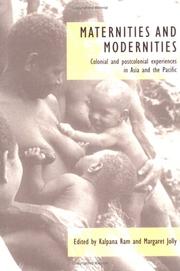
ISBN: 0521584280 0521586143 0511621825 Year: 1998 Publisher: Cambridge : Cambridge University Press,
Abstract | Keywords | Export | Availability | Bookmark
 Loading...
Loading...Choose an application
- Reference Manager
- EndNote
- RefWorks (Direct export to RefWorks)
Feminist theories have focused on contemporary, Western, middle-class experiences of maternity. This 1998 volume brings other mothers, from Asia and the Pacific, into scholarly view, aiming to show that birthing and mothering can be a very different experience for women in other parts of the world. The contributors document a wide variety of conceptions of motherhood, and drawing on ethnographic and historical research, they explore the relationships between motherhood as embodied experience and the local discourses on maternity. They show how the experience of motherhood has been influenced by missionaries, by colonial policies and by the introduction of Western medicine and biomedical birthing methods, and raise important questions about the costs and benefits of becoming a modern mother in these societies.
Motherhood --- Mothers --- Maternité --- Mères --- Maternité --- Mères --- Social Sciences --- Anthropology --- Moms --- Parents --- Women --- Housewives --- Pregnant women --- Maternity --- Parenthood
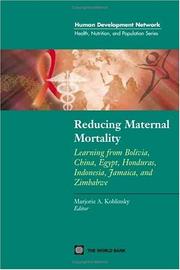
ISBN: 0821353926 9786610086627 1280086629 0585462739 Year: 2003 Publisher: Washington, DC : World Bank,
Abstract | Keywords | Export | Availability | Bookmark
 Loading...
Loading...Choose an application
- Reference Manager
- EndNote
- RefWorks (Direct export to RefWorks)
Sociology of the family. Sociology of sexuality --- Demography --- China --- Indonesia --- Egypt --- Zimbabwe --- Honduras --- Jamaica --- Bolivia --- Maternal health services --- Mothers --- Mortality. --- Moms --- Parents --- Women --- Housewives --- Motherhood --- Pregnant women
Book
ISBN: 9780292729902 9780292739239 0292729901 0292739230 9780292754348 0292754345 Year: 2012 Publisher: Austin : University of Texas Press,
Abstract | Keywords | Export | Availability | Bookmark
 Loading...
Loading...Choose an application
- Reference Manager
- EndNote
- RefWorks (Direct export to RefWorks)
Motherhood --- Mothers --- Maternité --- Mères --- History --- Histoire --- Motherhood. --- Mothers. --- Mutter. --- Römer. --- History. --- Greece. --- Rome (Empire). --- Griechenland (Altertum) --- Griechenland (Altertum). --- Maternité --- Mères --- Moms --- Parents --- Women --- Housewives --- Pregnant women --- Maternity --- Parenthood
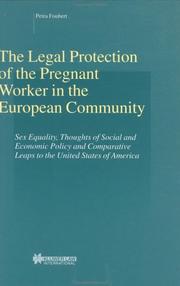
ISBN: 904111842X Year: 2002 Publisher: The Hague Kluwer
Abstract | Keywords | Export | Availability | Bookmark
 Loading...
Loading...Choose an application
- Reference Manager
- EndNote
- RefWorks (Direct export to RefWorks)
Social law. Labour law --- European Union --- United States --- Pregnant women --- Femmes enceintes --- Employment --- Law and legislation --- Travail --- Droit --- -Mothers --- -344.01763094 --- Ui4.g --- Moms --- Parents --- Women --- Housewives --- Motherhood --- Expectant mothers --- Gravida --- Mothers --- Pregnancy --- -Employment --- -Theses --- -Pregnant women --- -Social law. Labour law --- United States of America
Book
ISBN: 0814789439 9780814789438 0814752519 9780814752517 9780814759431 0814759432 9780814752517 9780814752524 0814752527 Year: 2012 Publisher: New York, NY
Abstract | Keywords | Export | Availability | Bookmark
 Loading...
Loading...Choose an application
- Reference Manager
- EndNote
- RefWorks (Direct export to RefWorks)
Explores the experiences of homeschooling mothers Mothers who homeschool their children constantly face judgmental questions about their choices, and yet the homeschooling movement continues to grow with an estimated 1.5 million American children now schooled at home. These children are largely taught by stay-at-home mothers who find that they must tightly manage their daily schedules to avoid burnout and maximize their relationships with their children, and that they must sustain a desire to sacrifice their independent selves for many years in order to savor the experience of motherhood. Home Is Where the School Is is the first comprehensive look into the lives of homeschooling mothers. Drawing on rich data collected through eight years of fieldwork and dozens of in-depth interviews, Jennifer Lois examines the intense effects of the emotional and temporal demands that homeschooling places on mothers’ lives, raising profound questions about the expectations of modern motherhood and the limits of parenting.
Women teachers. --- Mothers. --- Home schooling. --- Women as teachers --- Teachers --- Women educators --- Moms --- Parents --- Women --- Housewives --- Motherhood --- Pregnant women --- Domestic education --- Education, Home --- Home-based education --- Home education --- Home instruction --- Home teaching by parents --- Homeschooling --- Schooling, Home --- Education --- Parent participation --- Home schooling --- Women teachers --- Ecole à la maison --- Mères --- Enseignantes
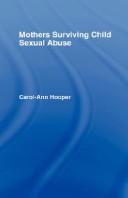
ISBN: 0203312252 1280338237 1134909276 0203214080 9780203312254 9780203214084 0415071879 0415071887 9786610338238 661033823X 9780415071871 0415071879 9781134909278 9781134909223 9781134909261 9781138994232 1134909268 Year: 1992 Publisher: London : London ; New York, NY : Tavistock publications, Routledge,
Abstract | Keywords | Export | Availability | Bookmark
 Loading...
Loading...Choose an application
- Reference Manager
- EndNote
- RefWorks (Direct export to RefWorks)
Despite increased recognition of the high incidence of child sexual abuse, little attention has so far been paid to the women on whom children primarily depend for care and protection - their mothers. Informed by theory and research on other situations involving loss, secrecy and moral dilemmas, as well as the rapidly accumulating knowledge of child sexual abuse, Mothers Surviving Child Sexual Abuse offers a new analysis of mother's reactions and responses, presenting a fresh perspective on a shocking problem for practitioners and policy-makers involved in child protection, as well as
Sexually abused children --- Incest victims --- Mothers --- Moms --- Parents --- Women --- Housewives --- Motherhood --- Pregnant women --- Sexual abuse victims --- Child sexual abuse victims --- Abused children --- Adult child sexual abuse victims --- Family relationships --- Attitudes --- Mothers of sexually abused children --- #GROL:MEDO-616.89*42.38 --- Sexually abused children's mothers
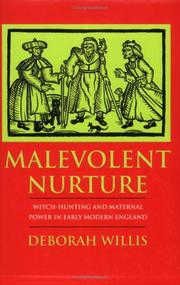
ISBN: 1501711601 9781501711602 0801481945 9780801481949 0801430046 9780801430046 0801481945 9780801481949 Year: 2018 Publisher: Ithaca, NY
Abstract | Keywords | Export | Availability | Bookmark
 Loading...
Loading...Choose an application
- Reference Manager
- EndNote
- RefWorks (Direct export to RefWorks)
Why were women far more likely than men to be executed for witchcraft in the early modern period? Questioning approaches that focus narrowly on the male role in witch-hunting in England and Scotland, Deborah Willis examines the fact that women were also frequently the accusers.Willis draws on the strengths of feminist, new historicist, and psychoanalytic criticism and on such primary sources as legal documents, pamphlet literature, religious tracts, and stage plays. Both the witch and her female accuser, Willis concludes, were engaged in a complex, intricate struggle for survival and empowerment in a patriarchal culture, and they stood in uneasy relation to definitions of female identity that rewarded nurturing behavior.Malevolent Nurture disentangles popular images of the witch from those endorsed by male elites. Among villagers, the witch was most typically imagined as a malevolent mother, while elites preferred to view her as a betraying servant of Satan. Analyzing King James VI and I's involvement in the North Berwick witchcraft trials, Willis shows how his elite atittudes were nevertheless influenced by his relationships with his brith mother, Mary Queen of Scots, and another maternal figure, Queen Elizabeth I.Willis also shows that Shakespeare, in Richard III, Macbeth, and Henry VI, and other middle-class playwrights incorporated the beliefs of the ruling class and villagers alike in their representations of witches.
Witchcraft in literature. --- Domestic drama, English --- Mothers --- Witches --- Witch hunting --- Occultists --- Warlocks --- Wiccans --- Burning witches --- Hunting witches --- Witch burning --- Witchburning --- Witchhunting --- Persecution --- Moms --- Parents --- Women --- Housewives --- Motherhood --- Pregnant women --- History and criticism. --- Social conditions. --- History. --- Persecutions --- Violence against --- Shakespeare, William, --- Knowledge --- Occultism.
Book
ISBN: 9781350337398 9781350337411 1350337412 Year: 2023 Publisher: London : Bloomsbury Academic,
Abstract | Keywords | Export | Availability | Bookmark
 Loading...
Loading...Choose an application
- Reference Manager
- EndNote
- RefWorks (Direct export to RefWorks)
"This book assesses a narrow but vital - and so far understudied - part of Roman women's lives: puberty, preparation for pregnancy, pregnancy and childbirth. Bringing together for the first time the material and textual sources for this key life stage, it describes the scientific, educational, medical and emotional aspects of the journey towards motherhood. The first half of the book considers the situation a Roman girl would find herself in when it came to preparing for children. Sources document the elementary sexual education offered at the time, and society's knowledge of reproductive health. We see how Roman women had recourse to medical advice, but also turned to religion and magic in their preparations for childbirth. The second half of the book follows the different stages of pregnancy and labour. As well as the often-documented examples of joyous expectation and realisation of progeny, there are also family tragedies - young girls dying prematurely, stillbirth, death in childbirth, and death during confinement. Finally, the book considers the social change that childbirth wrought on the mother, not just the new baby - in many ways it was also a mother who was in the process of being conceived and brought into the world"
Childbirth --- Pregnancy --- Reproductive health --- Women --- Motherhood --- Mothers --- History. --- Social conditions. --- Maternity --- Parenthood --- Moms --- Parents --- Housewives --- Pregnant women --- Gestation --- Conception --- Physiology --- Reproduction --- Human reproduction --- Human reproductive health --- Human reproductive medicine --- Reproductive medicine --- Health --- Birth --- Birthing --- Child birth --- Live birth --- Obstetrics --- Parturition --- Labor (Obstetrics) --- History --- Social conditions --- Health aspects
| Listing 1 - 10 of 61 | << page >> |
Sort by
|

 Search
Search Feedback
Feedback About UniCat
About UniCat  Help
Help News
News